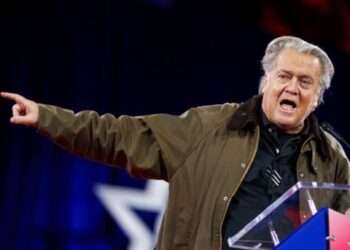Thursday, July 4th
Programming note: Today’s Independence Day special was pre-recorded with host Steve Bannon and author Patrick O’Donnell in the days before Bannon reported to Federal prison in Danbury, CT., to serve a four-month sentence for a misdemeanor that he was charged with for refusing to testify before an unconstitutional House committee.
Bannon’s long-standing tradition goes back to his “pre-WarRoom” days on Breitbart radio when he hosted O’Donnell on holidays to talk about American history.
Patrick K. O’Donnell Tells Early Stories Of The American Revolution
In this segment between Steve Bannon and Patrick K. O’Donnell, the two delve into the profound impact of America’s foundational conflicts. Bannon praises O’Donnell as a preeminent combat historian, setting the stage for a conversation on the American Revolution and the Civil War. O’Donnell underscores the immense challenges faced by the founding generation, who fought against the world’s most formidable army and navy. The conversation highlights the significance of the Fourth of July, touching on the Declaration of Independence and the pivotal battles of Gettysburg and Vicksburg during the Civil War.
O’Donnell emphasizes the brutality and determination inherent in America’s fight for independence. He recounts a specific event from 1769, where American sailors on the Pit Packet ship resisted impressment by the British Royal Navy, resulting in a deadly confrontation. This act of defiance illustrated the distinct, gritty spirit of Americans, as noted by Benjamin Franklin. Bannon and O’Donnell agree that these conflicts, characterized by fierce battles and political struggles, were crucial in shaping the nation and its enduring ideals of freedom and liberty.
O’Donnell Walks Through The Arguably First Shots Of The Revolution That Lead To Lexington & Concord
In this segment, Steve Bannon and Patrick O’Donnell revisited historical parallels between the Revolutionary War and contemporary political tensions. Bannon highlighted the escalating conflicts in 1773, including the Boston Massacre and the smallpox epidemic, which exacerbated divisions between Patriots and Loyalists. O’Donnell recounts how John Glover and the Patriots of Marblehead established a vaccination center on Cat Island, igniting political violence when Loyalists torched the facility. This incident demonstrated the fierce resistance and use of force by both sides.
Bannon and O’Donnell also discuss the strategic importance of arsenals and gunpowder, drawing a parallel to Lexington and Concord in 1775—the British aimed to seize colonial munitions, leading to the first shots of the Revolutionary War. O’Donnell describes the guerrilla tactics used by American militias against British forces, emphasizing the brutal nature of the conflict. Bannon compares these historical events to modern insurgencies, stressing the need to understand the harsh realities of the fight for liberty and freedom. The discussion underscores the enduring struggle for power and control and the crucial role of narrative in shaping revolutionary movements.
Patrick K. O’Donnell: How The Marble Headers Saved Americans At The American Dunkirk
Patrick K. O’Donnell: The American Thermopylae And Dunkirk Of The American Revolution
In this segment, Steve Bannon and Patrick K. O’Donnell discuss the intense debates and historical context surrounding the American Revolution:
Bannon reflects on the intensity of the debates among the American patriots, contrasting them with those who advocated for negotiation and legal recourse. He highlights figures like Dickinson who initially favored negotiation but eventually joined the Continental Army, emphasizing that the Revolution was fundamentally a fight for freedom that couldn’t be settled through debate alone.
O’Donnell expands on this, drawing parallels to British colonial tactics in Ireland and their harsh responses to rebellion, such as collective punishments like the Boston Port Act. He underscores the escalating tensions leading up to the Revolution, where each British action further alienated the colonies and escalated the conflict.
Together, they discuss the British response with a massive expeditionary force and the Hessians, emphasizing the scale and intent of the British to crush the rebellion by force. Bannon and O’Donnell contextualize these events within the broader struggle for American liberty, highlighting pivotal moments like the plot against Washington’s life and the formation of early American counterintelligence efforts.
This dialogue paints a vivid picture of the Revolutionary War as a visceral struggle for independence against overwhelming odds, shaped by both military conflict and political maneuvering on both sides of the Atlantic.
Patrick K. O’Donnell Explains What Began The End Of The Confederacy In The American Civil War
Steve Bannon expressed gratitude to Patrick K. O’Donnell for joining the discussion on the 4th of July and highlighted O’Donnell’s books as essential for understanding American combat history. Bannon mentioned that O’Donnell’s books are highly regarded, noting their popularity and positive reviews, including from outlets like the Wall Street Journal. He encouraged listeners to find O’Donnell’s books on platforms like Amazon and Barnes & Noble, where they have been bestsellers. Bannon emphasized the significance of commemorating historical events like Independence Day and expressed admiration for O’Donnell’s work, promising future discussions and thanking him for contributing to the understanding of American military history.
Steve Bannon: The Great Heroes Of America
Bannon reflected on the importance of understanding that anything of value in America has been earned through struggle and sacrifice. He referenced historical figures like Robert E. Lee, Grant, General Crook, and President Lincoln, highlighting pivotal moments such as the American Thermopylae in Brooklyn, where a small group’s defense allowed the Continental Army to survive a critical juncture. Bannon lamented the lack of recognition for these historical sites in Brooklyn and Manhattan, emphasizing the need for commemoration. He thanked his production team and encouraged sharing of their discussions, especially on significant holidays like the Fourth of July, emphasizing the enduring spirit of determination and resilience among the American people, echoing the sentiment of never quitting in the face of challenges.

![Bannon’s WarRoom, Show Clip Roundup 11/4/2024 [AM]](https://warroom.org/wp-content/uploads/2024/11/bannonsteve_022424gn06_w-350x250.webp)



